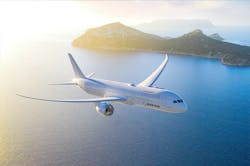Boeing to assess 19 technologies on its demonstrator aircraft
SEATTLE - The Boeing Company in Arlington, Va., announced that the company is expanding its ecoDemonstrator flight-test program to further accelerate innovation for sustainability and safety. The company released its 2023 plan to assess 19 technologies on the Boeing 777 ecoDemonstrator, while also adding "Explorer" airplanes that will focus tests on specific technologies.
The first ecoDemonstrator Explorer, a 787-10 Dreamliner, will conduct flight tests in June from Seattle to Tokyo, Singapore and Bangkok to demonstrate how coordinating navigation across global airspace jurisdictions can improve operational efficiency, which can reduce an airplane's fuel use and emissions by up to 10%. Utilizing today's onboard capabilities, Boeing and air navigation service providers (ANSPs) in the U.S., Japan, Singapore and Thailand will collectively sequence the airplane's routes to achieve the optimal flight path across multiple regions, factoring in conditions such as weather, air traffic and airspace closures. The airplane will fly on the highest available blend of sustainable aviation fuel (SAF) at each location.
In 2023, Boeing also will use its current flagship ecoDemonstrator airplane, a 777-200ER to test 19 technologies including:
Sustainable wall panels in the cargo hold that are made of 40% recycled carbon fiber and 60% resin made from a bio-based feedstock
A fiber optic fuel quantity sensor compatible with 100% SAF
An Electronic Flight Bag application featuring Smart Airport Maps, a component of Jeppesen FliteDeck Pro, which reduces operational costs and supports safe taxi operations with the depiction of contextual airport data
For all flight tests, the airplane will fly on the highest available blend of SAF locally.
"The industry will need continued fleet renewal, efficiency gains, renewable energy carriers such as sustainable aviation fuel and advanced technology to meet the civil aviation industry's commitment to achieve net zero carbon emission by 2050," said Boeing Chief Sustainability Officer Chris Raymond. "Our initial Explorer testing in partnership with aviation stakeholders in four countries is a great example of how we can work together to optimize operational efficiency and reduce emissions."
